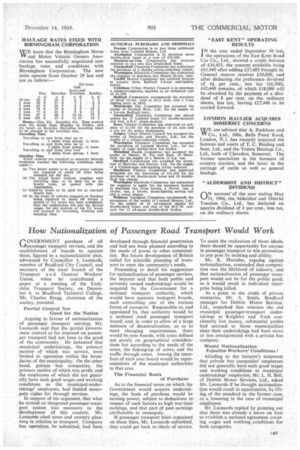How Nationalization of Passenger Road Transport Would Work G OVERNMENT purchase
Page 27

If you've noticed an error in this article please click here to report it so we can fix it.
of all passenger transport services, and the establishment of boards to operate them, figured in a nationalizatibn plan, advocated by Councillor J. Leonards, member of Bradford City Council, and secretary of the local branch of the Transport a n d General Workers' Union, when he contributed a paper at a meeting of the Yorkshire Transport Society, on December 4, at Bradford Technical College. Mr. Charles Bragg, chairman of the society, presided.
Partial Control Not Good for the Nation Arguing in favour of nationalization of passenger transport services, Mr. Leonards said that the partial Government control so far imposed on passenger transport had not been to the good of the community. He instanced that municipal undertakings, the primary motive of which was service, were limited to operation within the boundaries of the municipality. On the other hand, private bus companies, the primary motive of which was profit, and the employees of which did not generally have such good wages and working conditions as ffit municipal-undertakings' employees, had limited monopoly rights for through services.
In support of his argument, that what he termed an integrated passenger-transport system was necessary to the development of this country, Mr. Leonards cited town and country planning in relation to transport. Company bus operation, he submitted, had been developed through financial penetration and had not been planned according to the needs of towns or other communities. But future development of Britain called for scientific planning of transport to meet the community's needs.
Proceeding to detail his suggestions for nationalization of passenger services, the lecturer said that both public and privately owned undertakings would be acquired by the Government for a national transport authority, which would have separate transport boards, each controlling one of the various forms of transport. Responsible to, and appointed by, that authority would be a national road passenger transport board; and, in order to allow of a large measure of decentralization, so as to meet changing requirements, there would be area boards, with areas defined not purely on geographical considerations but according to the needs of the areas, the linking-up of areas, and the traffic through areas. Among the members of each area board would be representatives of the municipal authorities in that area.
The Financial Basis of Purchase As to the financial terms on which the Government would acquire undertakings, the basis of purchase would be earning power, subject to deductions in respect of such factors as high war-time earnings, and that part of past earnings attributable to monopoly.
If passenger transport were organized on these lines, Mr. ',canards submitted, they could get back to ideals of'service. To assist the realization of those ideals, there should be opportunity for anyone in passenger transport to win promotion to any post by training and ability.
Mr. K. Marsden, arguing against nationalization, contended that competition was the lifeblood of industry, and that nationalization of passenger transport would not be for the public good, as it would result in individual 'enterprise being killed.
As a point to the credit of private enterprise, Mr. A. Smith, Bradford manager for Hebble Motor Services, Ltd., remarked that whereas the old municipal passenger-transport undertakings at Keighley and York consistently lost money, substantial profits had accrued to those municipalities since their undertakings had been more or less amalgamated with a private bus company.
Would Nationalization Equalize Workers' Conditions ?
Alluding to the lecturer's statement that private bus" companies' employees did not generally have such good wages and working conditions as municipal undertakings' employees, Mr. L. H. Bell, Of Hebble Motor Services, Ltd., asked Mr. Leonards if he thought nationalization would result in equalization, by lifting of the standard in the former case, or a lowering in the case of municipal employees.
Mr. Leonards replied by pointing out that there was already a move on foot to ev,ablish a national agreement covering ,,,,ages and working conditions for both categories.




























































